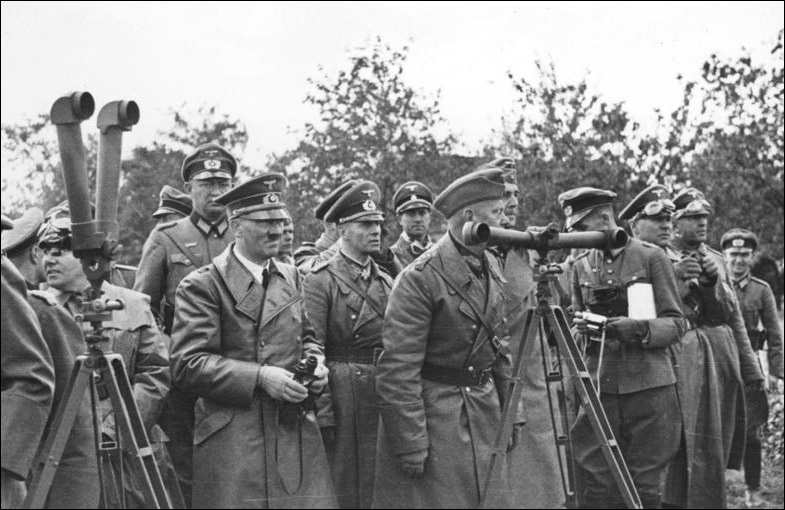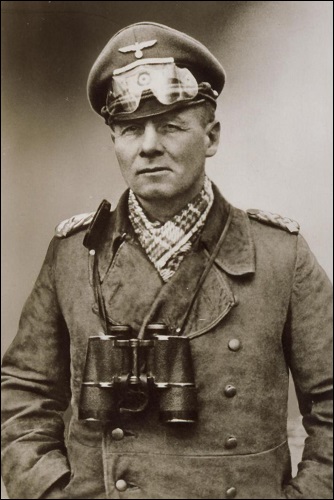No
senior general on the German side in World War II became
better known than Erwin Rommel. He was still a colonel on
the eve of the war and in 1938 was given command of the
Führer-Begleit-Battalion, Hitler’s personal military
escort. The Führer knew Rommel by reputation and looked
favorably on him because he was a fellow combat veteran of
the Great War—a decorated “front fighter” like himself.
Hitler had an interest in promoting the careers of such
officers as a counterblast against the clique of
aristocratic Prussian staff officers who ran the Army, and
whom he disliked and deeply distrusted. Rommel himself was a
Württemberger of middle-class background who did not wear
the silver-embroidered crimson collar insignia and crimson
trouser stripes of the
General Staff. Despite
this, he was promoted to major-general shortly before the
invasion of Poland (1 September 1939).
Thus
Rommel was well positioned to lobby for command of a
panzer division and this he
received at Hitler’s instigation after the Army personnel
office turned his request down, offering him a mountain
infantry division instead. He became commanding general of
the 7. Panzer-Division in time for the invasion of
France (10 May 1940) and his outstanding leadership of the
“Ghost Division,” as it came to be nicknamed, laid the
foundation of his later military reputation.
What is
remarkable is that at the time of his appointment, Rommel
had no particular experience of armored warfare. During the
Great War he’d served as an infantry officer in the crack
Alpenkorps, a mountain infantry division, primarily on
the Italian front. As an infantry company commander he
displayed the qualities of leadership that were later to
serve him so well in France and North Africa: dash, drive,
initiative, an intuitive feel for the battlefield. Rommel
was one of the very few junior infantry officers to receive
Imperial Germany’s highest military decoration, the coveted
Pour le Mérite,
known
colloquially
as the Blue Max. (Another
was the writer Ernst Jünger, author of the Great War
classic, Storm of Steel.)
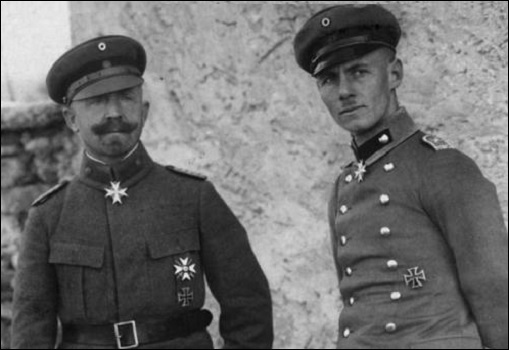
Lieutenant Rommel and a brother officer in
Italy, 1917. By this time he had been awarded the Blue Max
(Weapons and Warfare)
After
the war Captain Rommel was selected for retention in the
Reichsheer, the
100,000-man army allowed to Germany by the Treaty of
Versailles. In 1920 he received command of a company of
Infanterie-Regiment 13, then stationed in Stuttgart, a
post in which he remained for the next nine years.
Subsequently he was posted as an instructor to the Infantry
School in Dresden (1929-33), being promoted to major in
1932. A year later he was promoted to lieutenant-colonel and
given command of Jäger-Bataillon 3 of Infanterie-Regiment
17. In 1934 he met
Hitler for the first time, when the Führer reviewed the
battalion during an inspection tour.
In 1935 Lieutenant-Colonel
Rommel was posted as an instructor to the newly reopened War
Academy in Berlin, where he remained for the next three
years. It was during this time that he wrote
Infanterie greift an
(Infantry Attacks)
a narrative and analysis of his experiences as a Great War
infantry officer that became a bestseller. Among its many
readers was Hitler. The author had already come to the
Führer’s
notice as a gifted instructor and
on the strength of this he had Rommel appointed to the War
Ministry as military liaison officer to the Hitlerjugend
(Hitler Youth) organization. The appointment was not a happy
one. Rommel, the apolitical soldier, soon came into
collision with Baldur von Schirach, the HJ leader, over
training issues. Their disagreements proved intractable, and
in 1937 Colonel Rommel (as he was by
then) was
quietly transferred to the Theresian Military Academy in
Austria as its commandant.
But the HJ interlude did not diminish
Rommel’s
standing in Hitler’s eyes.
In 1938 the
Führer specifically requested his appointment as commander
of the new
Führer-Begleit-Battalion.
During the Polish campaign he accompanied Hitler on his
visits to the front, which gave him an opportunity to
observe the Panzerwaffe
in action. Having been promoted to major-general just before
the outbreak of the war, Rommel knew that he would likely be
offered a divisional command, and what he had seen in Poland
convinced him to request a panzer division.
Yet despite
Rommel’s
special relationship with Hitler, his attitude toward the
National Socialist regime was always equivocal. Without
doubt, he welcomed Hitler’s ascent to
power: As a German officer he had both patriotic and
professional reasons for supporting Hitler’s rearmament program
and foreign policy aims. Though he never became a formal
member of the Nazi Party Rommel was, until a relatively late
stage, a regime loyalist: a man who viewed with approval
much of the National Socialist program. But he
preferred to steer clear of politics—a preference that
became more and more problematical as he advanced in rank.
Unlike
many other senior generals Rommel never served on the
Eastern Front and had no first-hand knowledge of the worst
Nazi crimes. The war in North Africa, though not quite the
chivalrous affair of legend, was conducted by both sides
with a decent respect for the law of war. Yet Rommel cannot have been unaware of
the atrocities committed by German forces elsewhere,
nor of Nazism’s genocidal anti-Semitism. Certainly Rommel
shared some of the anti-Jewish and racial prejudices common
in Germany at the time. But he seems to have been disdainful
of Nazi racist ideology and is known to have expressed sharp
disapproval of the treatment meted out to German Jews in the
years before the war. Even so, the best that can be said of
him in this regard is that he preferred to look the other
way until force of circumstances compelled him to face the
facts.
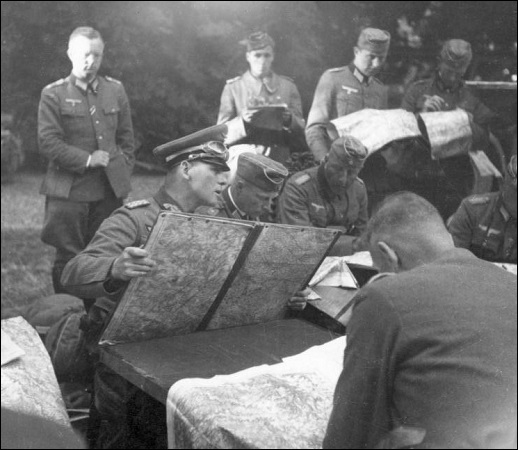
Rommel with officers of the 7.
Panzer-Division during the 1940 French campaign (Bundesarchiv)
But in
the spring of 1940 all that lay in the future. Commanding 7.
Panzer-Division in the invasion of France and the Low
Countries, Rommel displayed the same dash and decisiveness
that had won him the Blue Max as an infantry officer in the
Great War. But his real moment of glory came in February
1941 when he was promoted to lieutenant-general and made
commander of the Deutsches Afrikakorps,
a small, two-division mechanized corps. The DAK was intended
to bolster up the Italian Army in North Africa, which had
just been soundly defeated by a much smaller British force.
The high command in Berlin enjoined him to adopt a defensive
posture, but this direction and his technical subordination
to the Italian command in North Africa Rommel blithely
disregarded. In March he went over to the offensive with his
small force and in short order the British were bundled out
of Italian North Africa.
There
followed a year and a half of seesaw combat over the Western
Desert, in which the British were repeatedly out-generalled
by the Desert Fox, as Rommel soon became known. “Rommel,
Rommel, Rommel!” Winston Churchill was heard to say during
this period. “What else matters but beating him?” But in
Berlin the North African campaign was regarded as a sideshow
and the Chief of the General Staff, General Franz Halder,
looked with disfavor upon Rommel’s performance. The high
command’s attention was fixed on the Eastern Front, the DAK
was never given the additional forces that might have
enabled Rommel to score a decisive victory, and the Desert
Fox’s run of luck came to an end at El Alamein.
The
final stage of Rommel’s career was melancholy. Though
promoted to field marshal and hailed as a national hero, he
became depressed as the realization grew on him that
Hitler’s direction of the war and the crimes of the regime
were driving Germany to destruction. As has already been
noted, Rommel was not a
political soldier and he preferred to concentrate on his
military duties. But as he rose in rank involvement in
politics became unavoidable. His disillusionment stemmed
from the closing stages of the North African campaign when
for the first time he had to deal directly with Hitler's
military irrationality, and it was confirmed during the Battle
of Normandy in the summer of 1944.
In
November 1943, Rommel was appointed as General Inspector of
Western Defenses. What he found there appalled him: Hitler’s
vaunted Atlantic Wall was little more than a propaganda
myth. An Allied invasion of France in the spring of 1944
appeared inevitable, and Rommel argued to Field Marshal Gerd von
Rundstedt, the
Commander-in-Chief West, and to Hitler that a major buildup
of forces and defenses was urgently necessary. On
Rundstedt’s recommendation, Rommel was appointed to the
command of Army Group B, charged with the defense of the
most likely invasion sites: Normandy and the Pas de Calais.
He tackled the job with characteristic energy but soon found
himself embroiled in a debate over
basic strategy.
Rommel was convinced that the invasion must be defeated on
the beaches by immediately throwing in all available forces;
his superior Rundstedt argued for the creation of a large
operational reserve in readiness to launch a well-prepared
counterstroke once the main objective of the Allied attack became
apparent. Hitler, who had the last word, could not make up
his mind and so split the difference—with fatal results on
D-Day and after.
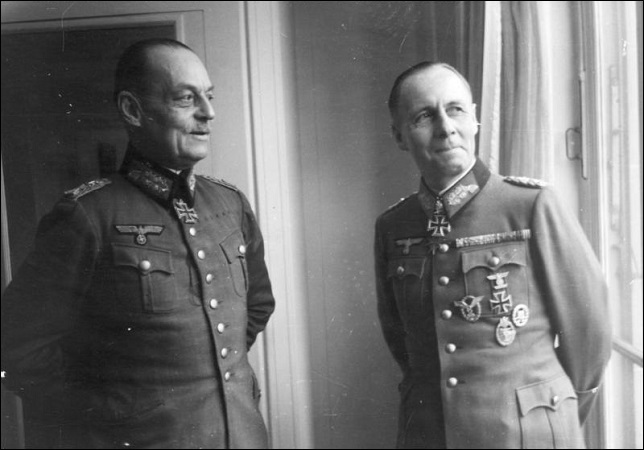
Rommel (right) with Field Marshal von
Rundstedt at the latter's headquarters in
Paris, early 1944
(Bundesarchiv)
Rommel
was absent in Germany on the day of the Allied invasion (6 June 1944), and during the
subsequent Battle of Normandy he never had an opportunity to
repeat his brilliant North African performance. Facing a
greatly superior enemy, hamstrung by
Hitler’s
stand-fast order,
he grew
increasingly pessimistic. When he and
Rundstedt met
with Hitler on 17 June, Rommel was blunt: the unequal
struggle on the Normandy front would end with the collapse
of the German Army and the loss of France. He suggested that
the
Führer should draw the inevitable political conclusions,
implying that Germany must sue for peace. Hitler brusquely
dismissed this advice, telling Rommel to mind his own
business and concentrate on his military duties.
Like
various other generals, then, Rommel turned against his
Führer
when it became clear that the war was lost, though the extent of
his involvement in the 20 July plot to assassinate Hitler
and overthrow the Nazi regime remains unclear. Rommel’s
chief of staff, Lieutenant-General Hans Speidel, was an
active conspirator, however, and it seems likely that
through him the Field Marshal became aware of the plot. Evidence
uncovered in 2018 indicates that Rommel was in contact with
other conspirators as well, and that after some soul
searching he came to the conclusion that Hitler and his
inner circle had to be eliminated.
But
Germany’s most famous soldier was not fated to play a role
in the drama of 20 July 1944. On 17 July the staff car
carrying Rommel was strafed by an RAF fighter-bomber. He was
seriously wounded and on 20 July lay unconscious in the
hospital. Though his doctors expected him to die, Rommel
rallied and eventually was discharged to convalesce at home.
While he languished there, the
Gestapo investigation into the assassination attempt brought his involvement to light. But unlike the other
conspirators Rommel was not dragged before the People’s
Court to be reviled and denounced by its venomous chief
judge,
Roland Freisler.
Hitler feared the consequences that might flow from
the public humiliation and execution of such a national
hero, so instead Rommel was offered an honorable exit.
He would be permitted to commit suicide, thus avoiding disgrace
and protecting his family from retaliation. Rommel agreed to
this and on 14 October 1944 he took the poison provided by
two officers who'd been sent to convey Hitler's offer. The German
people were told that the Desert Fox had died of his wounds;
his funeral and burial were conducted with full military
pomp.
Thus
ended the career of a legendary military figure. In
retrospect, however, it must be said that Erwin Rommel’s record
as a commander is mixed. He was certainly a valiant
soldier and a brilliant tactician but the Desert Fox never
had an opportunity to show what he could do at the highest
level of command. There is reason, indeed, to think that he
lacked the breadth of vision necessary for such a position. Rommel
tended to slight the logistical or administrative
side of war; it was other people's business to provide the
supplies that his troops needed.
He was at his best in a fluid, dynamic situation, leading
from the front, in direct touch with the battle, which was why desert warfare suited him so
well. In Normandy, commanding Army Group B against a greatly
superior enemy, he never had an opportunity to repeat that
performance.
As a
commander of men Rommel certainly possessed a deft touch.
Though he was unpretentious, he had presence and his junior
officers and troops—both German and Italian—were devoted to
him. And though he was critical—sometimes rudely so—of the Italian command, he was generous in his assessment of
the ordinary Italian soldiers who, he said, were not
responsible for the shortcomings of their leadership. When
after a battlefield setback an Italian battalion commander
protested to him, “Please believe me, my men are not cowards,” Rommel replied, “Who said anything about cowards? It’s the
fault of your leaders for sending you into action with such
poor equipment.”
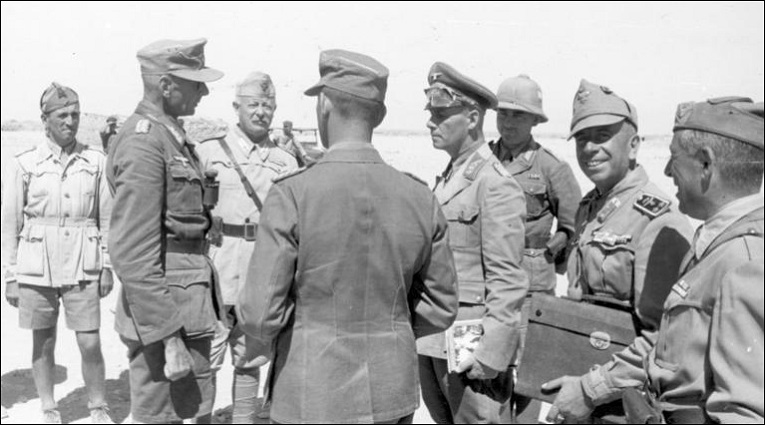
Rommel in North Africa with German and
Italian officers, 1941 (World War II Database)
Many
senior German generals were critical of Rommel, among them
his superior in France, Field Marshal von
Rundstedt.
Perhaps influenced by their dispute
over strategy, he
opined to the British military historian B.H. Liddell Hart
in a postwar interview
that the Desert Fox,
though undoubtedly a soldier's soldier,
was in over his head as an army group commander. Rundstedt
added, however, that
despite their disagreements
Rommel had been a loyal subordinate:
“When
I gave him an order, he carried it out without making any
difficulties.”
Perhaps the closest counterpart to
Rommel among the senior Allied generals was General George
S. Patton, another great fighting soldier who served at a
level below the summit of command. Though Rommel displayed
none of Patton’s self-conscious flamboyance and showmanship, he took the
same cut-and-thrust approach to armored warfare.
“L'audace,
l'audace, tojours l'audace,”
as Frederick the Great put it. Both Rommel and Patton
followed the King's advice.
But let
the last word on Erwin Rommel rest with Winston Churchill:
His
ardour and daring inflicted grievous disasters upon us,
but he deserves the salute which I made him—and not
without some reproaches from the public—in the House of
Commons in January 1942, when I said of him,
“We
have a very daring and skilful opponent against us, and,
may I say across the havoc of war, a great general.” He
also deserves our respect because, although a loyal
German soldier, he came to hate Hitler and all his
works, and took part in the conspiracy of 1944 to rescue
Germany by displacing the maniac and tyrant. For this,
he paid the forfeit of his life. In the sombre wars of
modern democracy chivalry finds no place.
The Second World War Volume III: The Grand Alliance
